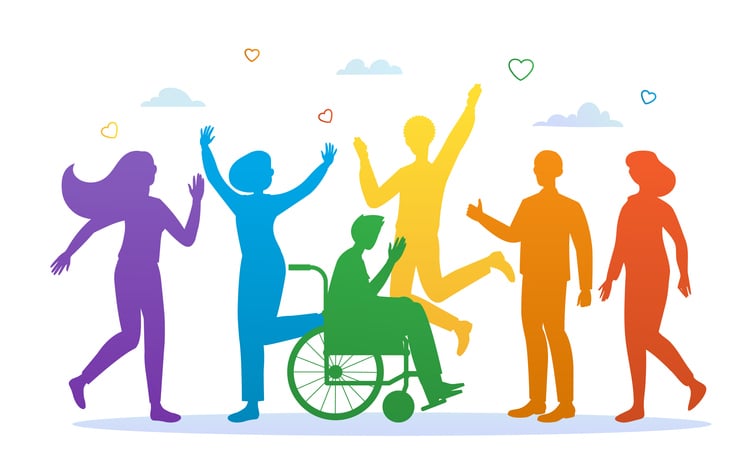Disability affects approximate 61 million, or nearly 1 in 4 (26%) of people in the United States. Including people with disabilities in everyday activities and creating accessible environments and equitable opportunities that support them in holding roles similar to their peers who do not have a disability is disability inclusion.
Disability inclusion entails identifying barriers that potentially impact people with disabilities to independently live and be fully engaged in their communities. Everyone can make a difference and play a part in addressing those barriers.
Nurses play a crucial role in creating more inclusive health care and providing high-quality care. Caring for disabled patients requires a compassionate and patient-centered approach.
Here are some best practices for Nurses to consider when caring for disabled patients:
Accessibility: Ensure that the environment is accessible and accommodates the needs of disabled patients. This includes providing ramps, handrails, and wide doorways for those with mobility impairments. Make sure medical equipment is accessible and that communication aids, such as hearing devices or visual aids, are readily available. Braille signs provide crucial information related to your medical facility for people with visual impairments, such as the location of your restrooms, exits, and more.
Develop a Personal Connection: Building a personal connection with your patients is essential for establishing trust and rapport. Take the time to get to know them as individuals, ask about their interests, hobbies, and goals. This not only helps create a positive and supportive environment but also enables Nurses to provide care that is tailored to their unique needs and preferences.
Foster Effective Communication: Effective communication is vital when caring for disabled patients. It is important to understand and respect their preferred method of communication, whether it is verbal, non-verbal, or through assistive devices. Take the time to listen attentively, use clear and simple language, and allow them sufficient time to express themselves. If needed, collaborate with speech therapists or communication specialists to enhance communication capabilities.
Promote Independence and Autonomy: Patients with disabilities often face challenges in performing daily activities. As a Nurse, it is important to promote independence and autonomy by encouraging patients to participate in their care and decision-making processes. Involve them in setting goals, planning their care, and making choices whenever possible. This fosters a sense of empowerment and enhances their overall well-being.
Address Physical and Emotional Needs: Disabled patients may experience physical and emotional challenges due to their condition. It is crucial for Nurses to address both aspects of their well-being. This includes providing appropriate pain management strategies, managing symptoms effectively, and promoting comfort and mobility. Additionally, Nurses should offer emotional support by actively listening, showing empathy, and providing resources for counseling or therapy if needed.
Collaborate with a Multidisciplinary Team: Caring for disabled patients often requires a multidisciplinary approach. Nurses should collaborate with other healthcare professionals, such as Occupational Therapists, Physical Therapists, Social Workers, and Psychologists, to provide comprehensive care. By working together, healthcare professionals can develop a holistic care plan that addresses the various aspects of a patient's well-being.
Stay Updated with Best Practices: The field of healthcare is constantly evolving, and it is essential for Nurses to stay updated with the latest best practices and evidence-based research. Continuous learning and professional development help Nurses enhance their knowledge and skills in caring for disabled patients. Attend workshops, conferences, and training sessions focused on disability care to stay informed about new techniques, technologies, and approaches.
Advocacy: Nurses can act as patient advocates by helping patients make informed or ethical decisions, translate medical terminology into common language, and navigate complex medical systems. Often, you are the closest healthcare provider to your patient. You can help protect their rights, health, and safety by upholding patient equality, making patients a priority, and being a reliable resource.
In conclusion, caring for disabled patients requires a compassionate and patient-centered approach. By implementing these best practices, Nurses can provide optimal care, promote independence, and improve overall well-being. Remember, each patient is unique, and providing person-centered care requires flexibility, empathy, and a willingness to adapt your approach to meet individual needs.


 Sexual harassment is a prevalent issue that can have far-reaching consequences. It can occur in any workplace, regardless of industry or job title. Nursing, unfortunately, is not immune to this problem.
Sexual harassment is a prevalent issue that can have far-reaching consequences. It can occur in any workplace, regardless of industry or job title. Nursing, unfortunately, is not immune to this problem. Nurses must always be prepared to care for patients from all backgrounds, including the LGBTQ+ community. Caring for the LGBTQ+ community requires an educated, compassionate, and inclusive approach. As Nurses, we ensure every patient receives the most personalized and competent care possible. Here are some tips to help you provide better care to the LGBTQ+ community.
Nurses must always be prepared to care for patients from all backgrounds, including the LGBTQ+ community. Caring for the LGBTQ+ community requires an educated, compassionate, and inclusive approach. As Nurses, we ensure every patient receives the most personalized and competent care possible. Here are some tips to help you provide better care to the LGBTQ+ community. Men's Health Month is an important observance aimed at raising awareness about the health issues affecting men and encouraging them to take proactive steps towards a healthier lifestyle.
Men's Health Month is an important observance aimed at raising awareness about the health issues affecting men and encouraging them to take proactive steps towards a healthier lifestyle.  Health disparities are the health differences experienced between different groups based on race, ethnicity, disability, sex/gender, socioeconomic status, educational level, and more. Unfortunately, the LGBTQ+ community is no exception to health disparities.
Health disparities are the health differences experienced between different groups based on race, ethnicity, disability, sex/gender, socioeconomic status, educational level, and more. Unfortunately, the LGBTQ+ community is no exception to health disparities.  Patient education is a crucial aspect of the Nursing practice, because it empowers patients to take an active role in their own healthcare. Nurses serve as educators, providing patients and their families with the knowledge and skills they need to make informed decisions about their health and well-being.
Patient education is a crucial aspect of the Nursing practice, because it empowers patients to take an active role in their own healthcare. Nurses serve as educators, providing patients and their families with the knowledge and skills they need to make informed decisions about their health and well-being. A positive workplace culture is essential for Nurses to provide excellent patient care. In addition, a positive workplace culture on Nursing units can positively impact job satisfaction, staff retention, and patient outcomes.
A positive workplace culture is essential for Nurses to provide excellent patient care. In addition, a positive workplace culture on Nursing units can positively impact job satisfaction, staff retention, and patient outcomes.